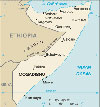
On October 29th, 2008 the State Department issued a press release condemning the day’s terrorist attacks in Somaliland and Puntland. Little did it know that a U.S. citizen, a 27 year-old college student from Minneapolis, Shirwa Ahmed, was one of the suicide bombers that killed 24 people. Ahmed is said to be the first U.S. citizen suicide bomber.
Ahmed’s actions have sparked the interest of the intelligence and homeland security communities. The October 29th bombings were attributed to al-Shabaab, a group with links to al-Qaeda and, as of February 2008, a State Department designated terrorist group. Analysts worry that this is not an isolated case. In a recent speech, FBI Director Robert Mueller III said, “We certainly believe that [Ahmed] was recruited here in the United States, and we do believe that there may have been others that have been radicalized as well.” Currently the FBI is actively investigating Somali populations in Boston, Columbus, San Diego, Seattle, and Portland, Maine.
The Senate Homeland Security Committee held a hearing yesterday to discuss al-Shabaab recruitment in the United States. One point that panelists agreed upon was the impact of the 2006 U.S.-backed Ethiopia intervention in Somalia. An expert from the National Counterterrorism Center stated, “The crisis in the Horn of Africa, which included the invasion of Somalia by Ethiopia, has attracted the rapt attention of Somali Diaspora communities and heightened their nationalistic sentiments.” Somali expert and Enough analyst Ken Menkhaus agreed, noting “U.S. policies both during and after the Ethiopian offensive were seen as silent on the extraordinary human costs, and Somalis took the silence to imply consent.”
While it is clear that the failed U.S.-backed intervention hardened the Diaspora’s views, any suggestion that the Diaspora is a direct threat to U.S. homeland security remains largely speculation at this point. Perhaps the broadest lesson is this: a failed foreign policy can have significant domestic repercussions.

